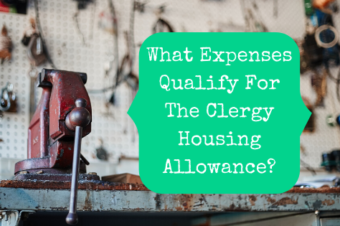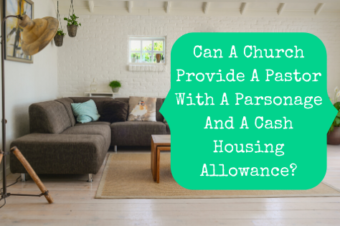
I recently received an email from a missionary who had just returned from overseas. She was living with her mother for a season and had some questions as to how the housing allowance applied in her circumstances since she was not paying rent.
This situation is probably more common than a lot of us realize. Whether it’s a missionary returning from overseas, a new seminary graduate just starting out in ministry, or a pastor living with a parent in a caretaker role, not all pastors pay for their housing or live in a parsonage. Are they still eligible to claim a minister’s housing allowance?
What Is The Minister’s Housing Allowance For?
The law itself, Section 107 of the Internal Revenue Code, states that the cash rental housing allowance is provided “to rent or provide a home… including furnishings and appurtenances such as a garage, plus the cost of utilities.” The purpose is to allow clergy a tax break in order to provide a home.
Homes take many shapes and sizes and come in various ways. Your home could be a parsonage, an RV, a highrise condo, a houseboat, or a family home in the suburbs. What matters is that you consider it your home and it is where you lay your head to rest at night. You might own your home, rent your home, live in a church-owned parsonage, or have another arrangement, such as living with someone for free. How you came to call it your home isn’t as important as the fact that it is, indeed, your home.
What Expenses Can Be Claimed If You Don’t Pay Rent
Before going any further, I must clarify something very important. You can only claim a clergy housing allowance on expenses that you actually pay. If someone else pays it or if you get it for free, you can’t include it in your housing allowance. As such, if you don’t pay rent, then you can’t include rent in your housing allowance. However, that doesn’t preclude you from claiming any other expenses incurred to provide a home.
Whether or not you pay for the house itself, you can still apply the minister’s housing allowance to any other home expenses you do pay. If you pay for utilities, you can claim that just the same as you could if you owned the home or lived in a traditional rental. If you’re paying to remove a troublesome tree, fix a deck, or replace a broken toilet, all of those expenses still qualify because you are paying them in order to provide a home for yourself even if you don’t hold the deed to the property.
My reader also asked if she could use a housing allowance to purchase a shed while living in her mother’s home. In general, a shed that is on the same property as the home is eligible for the housing allowance. If it is not on the property, or something like a rented storage unit elsewhere, then it is not eligible. Now, if she were purchasing the shed for her mother and it would be of no benefit to her, then she couldn’t include it in her housing allowance. However, if the shed is for her own use, then it doesn’t matter that she does not own the ground that it sits on as long as the property is her home.
How To Determine Which Expenses Qualify
Two good questions to ask yourself if you are wondering if an expense qualifies for the housing allowance are:
- Would you be doing it if you owned the house?
- If you rented from a stranger would you be doing it?
If the answer is yes, then whether or not you pay rent is irrelevant. You are incurring those expenses to provide a home, so they qualify for the pastor’s housing allowance. There are a few things that are specifically prohibited from inclusion in the housing allowance and you can see a detailed list of those here. And, as always, you cannot claim more than the fair market rental value of the furnished home.



